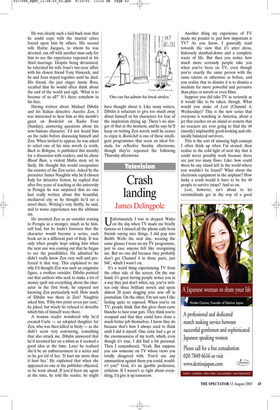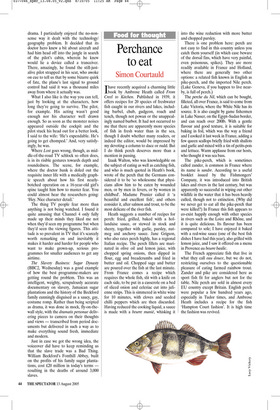Crash landing
James Delingpole
Unfortunately I was in deepest Wales on the day when TV made me briefly famous so I missed all the phone calls from friends saying nice things. I did pop into Builth Wells the next day, wearing the same glasses I wore on my TV programme, just in case anyone felt like recognising me. But no one did because they probably donŌĆÖt get Channel 4 in those parts, just S4C, which I wasnŌĆÖt on.
ItŌĆÖs a weird thing experiencing TV from the other side of the screen. On the one hand, itŌĆÖs great having people notice you in a way they just donŌĆÖt when, say, youŌĆÖve written only three brilliant novels and spent almost 20 years slogging your arse off in journalism. On the other, IŌĆÖm not sure I like feeling quite so exposed. When youŌĆÖre on TV, people think that this gives them carte blanche to hate your guts. They think youŌĆÖre overpaid and that they could have done a much better job themselves. I know they do because thatŌĆÖs how I always used to think until I did it myself. One critic had a go at the enormousness of my teeth, which, even though itŌĆÖs true, I did find a bit personal. Then I remembered, ŌĆśYeah. But suppose you saw someone on TV whose views you totally disagreed with. YouŌĆÖd use any ammunition against them you could, wouldnŌĆÖt you?ŌĆÖ God, itŌĆÖs an ignoble profession, criticism. If I werenŌĆÖt so right about everything, IŌĆÖd give it up tomorrow. Another thing my experience of TV made me ponder is: just how important is TV? As you know, I generally tend towards the view that itŌĆÖs utter dross, hideously dumbed-down and a complete waste of life. But then you notice how much more seriously people take you when youŌĆÖve been on TV, even though youŌĆÖre exactly the same person with the same talents or otherwise as before, and you realise that to dismiss it is to dismiss a medium far more powerful and pervasive than plays or novels or even films.
Suppose you did take TV as seriously as it would like to be taken, though. What would you make of Lost (Channel 4, Wednesday)? This is the new series that everyone is watching in America, about a jet that crashes on an island so remote that no rescuers are ever going to find the 48 (mostly) implausibly good-looking and ethnically balanced survivors.
This is the sort of amusing high concept I often think up when IŌĆÖm stoned, then realise in the cold light of next day that it could never possibly work because there are just too many flaws. Like: how could there be any island left in the world where you wouldnŌĆÖt be found? What about the electronic equipment in the airplane? How lucky a crash would it have to be for 48 people to survive intact? And so on.
Lost, however, isnŌĆÖt about to let verisimilitude get in the way of a good drama. I particularly enjoyed the no-nonsense way it dealt with the technology/ geography problem. It decided that its doctor hero knew a bit about aircraft and had him head off into the jungle in search of the pilotŌĆÖs cabin, wherein he knew would lie a device called a tranceiver. There, amazingly, he found the still-justalive pilot strapped in his seat, who awoke on cue to tell us that by some bizarre quirk of fate, the planeŌĆÖs last signal to ground control had said it was a thousand miles away from where it actually was.
What I also like is the way you can tell, just by looking at the characters, how long theyŌĆÖre going to survive. The pilot, for example. His acting wasnŌĆÖt good enough nor his character well drawn enough. So as soon as the monster noises appeared outside the cockpit and the pilot stuck his head out for a better look, I said to the wife: ŌĆśHeŌĆÖs expendable. HeŌĆÖs going to get chomped.ŌĆÖ And, very satisfyingly, he was.
Where Lost goes wrong, though, as middle-of-the-road TV schlock so often does, is in its risible gestures towards depth and roundedness. The scene, for example, where the doctor hunk is doled out the requisite inner life with a medically graphic speech about how his first nearlybotched operation on a 16-year-old girlŌĆÖs spine taught him how to master fear. You could almost hear the researchers going: ŌĆśHey. Nice character detail.ŌĆÖ The thing TV people fear more than anything is not being watched. I found it quite amusing that Channel 4 only fully made up their minds they liked me not when theyŌĆÖd seen my programme but when theyŌĆÖd seen the viewing figures. This attitude is so prevalent in TV that itŌĆÖs scarcely worth remarking on and inevitably it makes it harder and harder for people who want to make grown-up, serious programmes for smaller audiences to get any airtime.
The Slavery Business: Sugar Dynasty (BBC2, Wednesday) was a good example of how the best programme-makers are getting round the problem. This was an intelligent, weighty, scrupulously accurate documentary on slavery, Jamaican sugar plantations and the history of the Beckford family cunningly disguised as a saucy, gay, costume romp. Rather than being scripted as drama, it was done in mock, fly-on-thewall style, with the dramatis personae delivering pieces to camera on their thoughts and views ŌĆö transcribed from period documents but delivered in such a way as to make everything sound fresh, immediate and modern.
Just in case we got the wrong idea, the voiceover did have to keep reminding us that the slave trade was a Bad Thing. William BeckfordŌĆÖs Fonthill Abbey, built on the profits of his family sugar plantations, cost ┬Ż20 million in todayŌĆÖs terms resulting in the deaths of around 3,000 slaves.












































 Previous page
Previous page